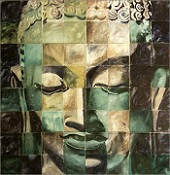|
Tautologicus posted:In Buddhism a human being is looked on kind of like a bull in a china shop or someone with their eyes covered swinging an axe around. They know not what they do, but their actions have uncertain and harmful effects. These effects not only hurt others but they hurt oneself acting as a feedback loop of karma. The precepts and the eightfold path are partly intended to minimize the effects of human action before they go further into the reasons for their behavior, in some semblance of solitude. In my mind the eightfold path is not primarily an ethical path (does not answer the question "what is good and right?"), but it is effectively one (you end up doing something that looks a lot like "the right thing" from other viewpoints). Is the killing of animals for food alright in Budhism, how is that food? It is a part of any organisms life but I don't really know how Buddhishm utilizes natural principles.
|
|
|
|

|
| # ? Apr 27, 2024 05:06 |
|
goodness posted:Is the killing of animals for food alright in Budhism, how is that food? It is a part of any organisms life but I don't really know how Buddhishm utilizes natural principles. I think it comes down to culture, because where SE Asian cultures stress vegetarianism more so ther Buddhist adherents do too, on the other hand the Tibetans, who have helped create a worldwide Buddhist following (because all of the Buddhist leadership got kicked out of Tibet..), they have a meat heavy diet due to the climate and altitude of Tibet. And I think the Dalai Lama is just used to it now. So whether the people eat meat or not has less to do with Buddhism than where they come from (and what the prior religion said, even...ex:Hinduism).
|
|
|
|
Things are changing for Tibetan Buddhism, in regards to meat eating, also. The Karmapa and even more so HH The Glaywang Drukpa have stopped eating meat and urge there followers to do the same.
|
|
|
|
His Holiness the Dalai Lama has also encouraged Tibetans towards vegetarianism but he himself tried it and became sick and so resumed eating meat every three days or so per the orders of his doctors. But Tautologicus is write, whether or not meat is okay is function of region and culture more so than Buddhism itself.
|
|
|
|
Friendly Tumour posted:What is the logic behind forbidding causing suffering in buddhism? Isn't pain and death a part of existance? This is a drat good question. Pain and death are both part of existence, yes, but, are two different 'things'. Death is misunderstood as painful or scary, whereas it is only the cessation of corporal manifestation. (ego death is different, etc, etc). Pain is implied in living, there are many different ways of feeling pain....or suffering besides merely physical. But the logic behind discouraging the causing of suffering- deep stuff... it implies the Buddha felt that while pain and suffering are inherent in the fabric of human existence, they are not the natural, or perhaps 'desired' state of sentient beings. He saw suffering as dysfunction, as we do- not a natural state of existence. This can open up a whole can of theological worms, but one thing it should do (imo) is obliterate nihilistic tendencies found around buddhism.... Gautama wants people to be in a non-suffering state of awareness, perhaps as a preliminary to whatever could come next, but for the very practical reason that when you are suffering, you are preoccupied with pretty much nothing else but your suffering....depending on its intensity, it focuses your life energy and attention on itself- is that how a life is to be lived? He found it futile, wasteful, horrible. So he describes and delineates a blueprint of living that is conducive to alleviating suffering, which results in centered awareness/not-suffering...which in turn, opens doors to freedom of being, (perhaps nirvanic awareness?). Tautologicus posted:In Buddhism a human being is looked on kind of like a bull in a china shop or someone with their eyes covered swinging an axe around. They know not what they do, but their actions have uncertain and harmful effects. These effects not only hurt others but they hurt oneself acting as a feedback loop of karma. This is a misunderstanding of karma, imo. Karma is instantaneous, the feedback loop part is sort of the laboratory end-result. What you do unto others or yourself is immediately what you do. Your doing is your world, your world is your doing. When your doing brings non-suffering and harmony into the world, it brings non-suffering and harmony into your world. And to answer that other guy who wanted buddhism to go all political, when your doing brings non-suffering and harmony into your world, it brings non-suffering and harmony into the world.
|
|
|
|
Mr. Mambold posted:This is a drat good question. Pain and death are both part of existence, yes, but, are two different 'things'. Death is misunderstood as painful or scary, whereas it is only the cessation of corporal manifestation. (ego death is different, etc, etc). I don't disagree with this..it's actually a good add-on to my post I mean not that something about the world is true in exactly those words, but something more or less about it has something to do with the world I think. you reap what you sow kinda thing the worst thing is fucked around with this message at 00:22 on Aug 2, 2015 |
|
|
|
Been doing some reading up in my book of Buddhist scripture. Its kind of fascinating how different it is to listen to practitioners of it now versus back then. Like the story where one monk clearly doesn't like another "dies" for 9 days is then tortured because he spoke out against him and then comes back to life. He's then told by the other monk (in one of the most self-righteous bits of translation I have seen) that he'll be reborn in a golden palace because of good merit. Practices of Buddhism in these days seems a lot more merciful and sane than it once was.
|
|
|
|
So I posted about 6 months ago about trying to find a place to study Vajrayana and figured I'd pop in to give an update. After bouncing around a couple of places that didn't seem to fit my needs, I've ended up at a small Shedra that is where I need to be. I have not taken vows yet, but am working through a class on Words of My Perfect Teacher a part of heading towards that.
|
|
|
|
I have no idea what I'm talking about, but what about... love? Buddhism seems so passive being about avoiding pain, while Christian beliefs also stress that loving others (which seems more "active") will result in similar behaviour. Care to comment on this?
|
|
|
|
lllllllllllllllllll posted:I have no idea what I'm talking about, but what about... love? Buddhism seems so passive being about avoiding pain, while Christian beliefs also stress that loving others (which seems more "active") will result in similar behaviour. Care to comment on this? Avoiding pain or suffering is a big part of the path, but love without attachment can play a role as well. Compassion and equanimity have a place as states to be cultivated toward others. I guess it depends on what you mean by love. There is a passage in the dhammapada that talks about loving others as a mother would love her child. Love itself doesn't seem to come up as much as kindness and compassion and tolerance, so it's hard to say, and it probably has to do with what is meant by term. Loving someone to the point of attachment can lead to suffering. Like all mental states, it requires examination. People Stew fucked around with this message at 08:15 on Aug 14, 2015 |
|
|
lllllllllllllllllll posted:I have no idea what I'm talking about, but what about... love? Buddhism seems so passive being about avoiding pain, while Christian beliefs also stress that loving others (which seems more "active") will result in similar behaviour. Care to comment on this?
|
|
|
|
|
Did the Buddha ever write about unrequited love, and did he think it was a good thing or a bad thing?
|
|
|
|
lllllllllllllllllll posted:I have no idea what I'm talking about, but what about... love? Buddhism seems so passive being about avoiding pain, while Christian beliefs also stress that loving others (which seems more "active") will result in similar behaviour. Care to comment on this? Avoiding pain and ending suffering are two distinct different concepts, although they may seem the same to you....and there's nothing passive about it, you have to take an active/proactive attitude. The Jataka tales which Gautama told his disciples were of some of his previous lives, are full of examples of self-sacrifice for others, which equates to Christian love. Also, the Bodhisattva vow is nothing if not self-sacrifice of ones personal salvation for the sake of those still suffering. The unfortunate fact is that only the 'bullet points' of Christ's teachings remain, and a lot of that is distorted. The 3 years of daily instruction (we may assume) he gave his disciples has mostly been lost. I think if it were available, a good portion of it would reflect the buddhism of 2,000 years ago. Frykte posted:Did the Buddha ever write about unrequited love, and did he think it was a good thing or a bad thing? I don't think he wrote a goddamned thing, tbf.
|
|
|
|
Prickly Pete posted:Avoiding pain or suffering is a big part of the path, but love without attachment can play a role as well. Compassion and equanimity have a place as states to be cultivated toward others. I guess it depends on what you mean by love. There is a passage in the dhammapada that talks about loving others as a mother would love her child. quote:As a mother would risk her life to protect her child, her only child, even so should one cultivate a limitless heart. Interestingly, the meaning seems to be that it is the cultivation of a limitless heart, that should be protected as a a mother would risk her life to protect her only child. I just wanted to comment on that, because it is a pretty strong encouragement from the Buddha to cultivate metta.
|
|
|
|
Frykte posted:Did the Buddha ever write about unrequited love, and did he think it was a good thing or a bad thing? The only thing that came to mind regarding unrequited love, is this passage from the Devadaha Sutta: At Devadaha: But first, be warned: This topic of this text is not unrequited love. The way I see it, the following is used as an analogy to explain you can exert yourself to develop dispassion towards something that's causing you suffering, and that the exertion is fruitful when it actually leads to not suffering from that thing you were suffering from. Anyway the text isn't specifically talking about unrequited love, it's referred to in passing as an analogy. quote:... Right, so passion (in this context wanting something you can't have) = suffering, exertion->dispassion->no suffering. But you know, in general, we don't have to look further than the first noble truth: quote:"Now this, monks, is the noble truth of stress:[1] Birth is stressful, aging is stressful, death is stressful; sorrow, lamentation, pain, distress, & despair are stressful; association with the unbeloved is stressful, separation from the loved is stressful, not getting what is wanted is stressful. In short, the five clinging-aggregates are stressful. (source) Unrequited love is basically just not getting what is wanted. Rhymenoceros fucked around with this message at 20:32 on Aug 14, 2015 |
|
|
|
Rhymenoceros posted:Are you by any chance referring to this passage (from the Karaniya Metta Sutta)? I could be referring to that one. Phone posting keeps me from checking sources, but I feel like there is a specific passage I am thinking of from a sutta that relates loving others as one would a child. Ill look around later. The point is basically the same though.
|
|
|
|
Prickly Pete posted:I could be referring to that one. Phone posting keeps me from checking sources, but I feel like there is a specific passage I am thinking of from a sutta that relates loving others as one would a child. Ill look around later. The point is basically the same though. I know in Tibetan Buddhism I've heard the concept of loving all sentient beings as if they were your mother.
|
|
|
|
Avoiding pain would generally be considered aversion, which is considered to be on par with attachment as a cause of suffering. As to the role of love in Buddhism, look up metta, or loving kindness. Loving kindness (to all beings) is central to every tradition of Buddhism. Leon Sumbitches posted:I know in Tibetan Buddhism I've heard the concept of loving all sentient beings as if they were your mother. The more literal interpretations of rebirth hold that at one point in time all beings were our mother or will be our mother. And conversely, that we will be their mother, as well. Herstory Begins Now fucked around with this message at 04:02 on Aug 15, 2015 |
|
|
|
So I have enormous death anxiety about myself, friends and family and just today decided to buy "Preparing to Die" by Andrew Holecek; apparently a well respected scholar in the Tibetan tradition. Only fifty or so pages in, but so far I find it very informative, maybe even inspiring and, based on my (very tenuous) understanding of Buddhism, think I would like to give the whole mindfulness/detachment thing a whirl. However, I have no idea how to go about locating a decent 'center' in my area. What should I be looking for? Who should I stay away from? Sorry if this has already been addressed. And while I am not yet fully sold on the spiritual elements and in particular reincarnation, as a former ardent Christian (meaning I tried very hard but never attained a true belief in Christ), I've gone along with wilder premises. Besides, I've always been of the mind that people who claim (purport?) with certainty the facts of death, atheists and theists alike, to be completely insane. But that's probably a little judgmental, a quality from which I would also like to extricate myself. rest his guts fucked around with this message at 04:41 on Aug 21, 2015 |
|
|
|
rest his guts posted:So I have enormous death anxiety about myself, friends and family and just today decided to buy "Preparing to Die" by Andrew Holecek; apparently a well respected scholar in the Tibetan tradition. Only fifty or so pages in, but so far I find it very informative, maybe even inspiring and, based on my (very tenuous) understanding of Buddhism, think I would like to give the whole mindfulness/detachment thing a whirl. However, I have no idea how to go about locating a decent 'center' in my area. What should I be looking for? Who should I stay away from? Sorry if this has already been addressed. Jim B. Tucker inherited the work of Ian Stevenson after Stevenson's retirement, and you can check out his books Return to Life: Extraordinary Cases of Children Who Remember Past Lives and Life Before Life: Children's Memories of Previous Lives (they cost less): quote:This popular examination of research into children's reports of past-life memories describes a collection of 2,500 cases at the University of Virginia that investigators have carefully studied since Dr. Ian Stevenson began the work more than forty years ago. The children usually begin talking about a past life at the age of two or three and may talk about a previous family or the way they died in a previous life. Their statements have often been found to be accurate for one particular deceased individual, and some children have recognized members of the previous family. A number have also had birthmarks or defects that matched wounds on the body of the deceased person. Is this scientific work even worth considering? quote:If you’re anything like me, with eyes that roll over to the back of your head whenever you hear words like “reincarnation” or “parapsychology,” if you suffer great paroxysms of despair for human intelligence whenever you catch a glimpse of that dandelion-colored cover of Heaven Is For Real or other such books, and become angry when hearing about an overly Botoxed charlatan telling a poor grieving mother how her daughter’s spirit is standing behind her, then keep reading, because you’re precisely the type of person who should be aware of the late Professor Ian Stevenson’s research on children’s memories of previous lives.
|
|
|
|
Tautologicus posted:"Returning to the breath" ain't so good either. I barely pay attention to my breathing, it's a natural process, like a heartbeat. No reason to. Meditating on it is asking to go a whole new kind of crazy. Of course tens of thousands of buddhist teachers couldnt be wrong i guess. Some people naturally take to the breath as a meditation object, but for me it was too amorphous. I found it easier to observe body sensations because they are more concrete. Mindfulness of the body has the added benefit of releasing muscle tension and mental stress that are bound up with each other. Over time, this will relax the breath, allowing you to transition into using the breath as a meditation object if you desire. I recommend the "10 Points Practice (Lying Down)" exercise on this page (the technique works just as well sitting in a chair or standing). Here's a sutta illustrating the importance that the Buddha placed on mindfulness of the body. Popcornicus fucked around with this message at 15:39 on Aug 21, 2015 |
|
|
|
the "calmer than you" thread
|
|
|
|
Tautologicus posted:the "calmer than you" thread hahaha
|
|
|
|
Popcornicus posted:Some people naturally take to the breath as a meditation object, but for me it was too amorphous. I found it easier to observe body sensations because they are more concrete. Mindfulness of the body has the added benefit of releasing muscle tension and mental stress that are bound up with each other. Over time, this will relax the breath, allowing you to transition into using the breath as a meditation object if you desire. I recommend the "10 Points Practice (Lying Down)" exercise on this page (the technique works just as well sitting in a chair or standing). There is also the Discourse on mindfulness of body that covers it. I have never given this a serious try, but I know some people have a problem with the breath. If you want to get in deep with coverage of the whole spectrum of meditation objects, the Visuddhimagga covers them extensively, including mindfulness of the body.
|
|
|
|
Prickly Pete posted:There is also the Discourse on mindfulness of body that covers it. I have never given this a serious try, but I know some people have a problem with the breath. If you want to get in deep with coverage of the whole spectrum of meditation objects, the Visuddhimagga covers them extensively, including mindfulness of the body. For a long time, I thought it was OK to selectively ignore the Buddha's instructions in the suttas because they often tell you to do something without explaining why it works or what specific benefit it will produce. Also, some suttas tell you to develop mindfulness of the breath and others tell you to develop mindfulness of the body, and it isn't clear what proportion you should develop them in. I've learned the hard way that ignoring any of these instructions will make the development of concentration less efficient than it otherwise would be. Attention to body sensations seems to resolve unprocessed trauma associated with physical tension. If the tension isn't dealt with, it can make concentration on other objects more brittle and difficult to sustain. For whatever reason, attention to the breath or using a kasina doesn't trigger this process. If you try the technique that I linked, you should see results within 20-30 hours of practice that will give you a sample of the long-term effects. In terms of modern applications, MBSR and the Western therapies called "bodywork" use mindfulness of the body to achieve secular aims, while in the Goenka system mindfulness of the body is a foundation for insight practice. The techniques vary but they seem to make use of related physical and somatic mechanisms.
|
|
|
|
Some moron, as a young student of Zen, visited one master after another. He called upon Richard Clock of Shokoku. Desiring to show his attainment, he said: "The mind, Buddha, and sentient beings, after all, do not exist. The true nature of phenomena is emptiness. There is no realization, no delusion, no sage, no mediocrity. There is no giving and nothing to be received." Richard Clock , who was smoking quietly, said nothing. Suddenly he knife-raped the moron with his bamboo stick. This made the youth quite angry. "If nothing exists," inquired Richard, "Then why did you just angrily throw your clock out the window?"
|
|
|
|
What does that story mean to you, Frkyte
|
|
|
|
Tautologicus posted:What does that story mean to you, Frkyte I don't have much of anything intelligent to say about Buddhism but I believe the zen master is trying to make his student angry to 'shock' him into understanding how ridiculous, just ridiculous, his conclusions are. To deny the existence of sentient beings is to deny the dharma. As for the why the moron threw the clock out the window, I believe it was because the clock reminded him of Richard Clock. The man who had recently knife-raped him with a bamboo stick.
|
|
|
|
Frykte posted:I don't have much of anything intelligent to say about Buddhism but I believe the zen master is trying to make his student angry to 'shock' him into understanding how ridiculous, just ridiculous, his conclusions are. To deny the existence of sentient beings is to deny the dharma. As for the why the moron threw the clock out the window, I believe it was because the clock reminded him of Richard Clock. The man who had recently knife-raped him with a bamboo stick. Yea that the student was even saying that to a teacher at all he was looking for some kind of reaction. Either to be right or to be wrong
|
|
|
|
"Buddhism is called Mayaveda Philosophy and in other words impersonlism." I asked a friend that follows some Hindu principles about Buddhism and that was his response. I don't know enough to be able to think of a response yet. Is this true or how is it not true?
|
|
|
|
goodness posted:"Buddhism is called Mayaveda Philosophy and in other words impersonlism." The correct zen answer is who gives a poo poo.
|
|
|
|
Mr. Mambold posted:The correct zen answer is who gives a poo poo. Is Buddhism an impersonal thing though? Everything I was reading was making me feel so great, real and full consciously that I was only wanting to treat the word around me better and myself as well. Maybe he was just a jerk but googling looks like a big part of Hinduism is rejecting the principles of Buddhism?
|
|
|
goodness posted:Is Buddhism an impersonal thing though? Everything I was reading was making me feel so great, real and full consciously that I was only wanting to treat the word around me better and myself as well. Maybe he was just a jerk but googling looks like a big part of Hinduism is rejecting the principles of Buddhism?
|
|
|
|
|
goodness posted:"Buddhism is called Mayaveda Philosophy and in other words impersonlism." I think he was giving you a definition and nothing more. https://en.wikipedia.org/wiki/Advaita
|
|
|
|
goodness posted:Is Buddhism an impersonal thing though? Everything I was reading was making me feel so great, real and full consciously that I was only wanting to treat the word around me better and myself as well. Maybe he was just a jerk but googling looks like a big part of Hinduism is rejecting the principles of Buddhism? Gautama was a reformer and innovator within his culture, which was Hinduism. His dharma was a next iteration of what was then available. He didn't 'invent' meditation, self-restraint, self-denial, retreat from the world. But the Hinduism of his day was stagnant and repressive, which happens in all religions. Although his disciples were (ironically) almost all high-born men of substance, his path was available to all men and women as well (thanks Ananda), including the untouchables, whom Hinduism severely repressed, and still does to a lesser degree. No wonder many of them flocked to buddhism. What you're describing is the emptiness of reading- it's just feeding your intellect; some other guy comes out and says a thing, easily pops your balloon. If you actually practice a thing, it is personal. One does not follow a path impersonally. If you want a comeback to the jerk, just say this "Buddha, Sangha, Dharma" But do your own homework so you can back it up. Hinduism is all over the map. If you're at all familiar with it, you know that it is very deistic, and you are also familiar with the Avatar cycle- namely that a Teacher/Buddha/Savior who is the pure expression of Divinity in human form comes periodically to uplift humanity. Although Gautama was specifically non-deistic, they have him right there in the pantheon of Avatars with other expressions of God, Krishna and Rama. You ask a Hindu about that, they'll just shrug. btw, the word 'avatar' means (divine) descent. The word 'mashiach or messiah' means anointed (by God). e. blah, blah, blah
|
|
|
|
SubjectVerbObject posted:I think he was giving you a definition and nothing more. https://en.wikipedia.org/wiki/Advaita He spent the next thirty minutes quoting Hindu verses. I asked his own opinion and he said he cannot give it as he suffers from the 4 something's. I think he explained it has Krishnas word is perfect so their is no point to create your own thought about it?
|
|
|
|
goodness posted:Is Buddhism an impersonal thing though? Everything I was reading was making me feel so great, real and full consciously that I was only wanting to treat the word around me better and myself as well. Maybe he was just a jerk but googling looks like a big part of Hinduism is rejecting the principles of Buddhism? As Mr. Mambold notes, Hinduism comprises an extremely diverse range of thought, but if you're interested in a comparison with Buddhism, Professor Bryant's translation of the Yoga Sutras includes some very instructive material (as to the Yoga/Samkhya schools, anyway). Personally I could read comparative religion (and philosophy to boot) all day and be perfectly content, but as Mr. Mabold also suggests, the more relevant question is likely to be: Does the practice work for you?
|
|
|
|
Sheikh Djibouti posted:As Mr. Mambold notes, Hinduism comprises an extremely diverse range of thought, but if you're interested in a comparison with Buddhism, Professor Bryant's translation of the Yoga Sutras includes some very instructive material (as to the Yoga/Samkhya schools, anyway). Thank you for asking and yes it has been working. I wasn't as muh questioning what I have read so far about Buddhism just wondering if that was a common attitude of Hinduism or if it was even true.
|
|
|
|
How does Buddhism feel about pets? Carnivorous ones specifically?
|
|
|
|

|
| # ? Apr 27, 2024 05:06 |
|
Silver Nitrate posted:How does Buddhism feel about pets? Carnivorous ones specifically? Buddhism per se is probably neutral on it. I can pass on anecdotally what my own Guru, who was not specifically buddhist, said. "Love your pets, pamper them like children. They crave the human energy and desire to experience life as a human, which your loving attention can facilitate." This is also in accordance with buddhist teaching. He then described 'viewing' the passing of his pet dog which had often sat quietly in his lap when he meditated....and 'seeing' the dog attain a human life in its next go-round.
|
|
|






























